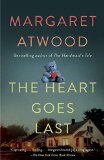Summary | Excerpt | Reading Guide | Reviews | Beyond the Book | Readalikes | Genres & Themes | Author Bio

A Novel
by Margaret Atwood
No such luck for Stan, with the odd jobs: overqualified, was what they told him at the employment office. He said he wasn't picky – he'd clean floors, he'd mow lawns – and they smirked (what floors? what lawns?), and said they'd keep him on file. But then the employment office itself closed down, because why keep it open if there was no employment?
They held on in their little house, living on fast food and the money from selling the furniture, skimping on energy use and sitting in the dark, hoping things would take an upturn. Finally they put the house on the market, but by then there were no buyers; the houses on either side of theirs were already empty, and the looters had been through them, ripping out anything that could be sold. One day they had no mortgage money left, and their credit cards were frozen. They walked out before they were thrown out, and drove away before the creditors could grab their car.
Luckily Charmaine had saved up a little stash of cash. That, and her tiny pay packet at the bar, plus tips – those have kept them in gas, and a post-office box so they can pretend to have an address if anything does come up for Stan, and the odd trip to the laundromat when they can't stand the griminess of their clothes.
Stan has sold his blood twice, though he didn't get much for it. "You wouldn't believe it," the woman said to him as she handed him a paper cup of fake juice after his second blood drain, "but some people have asked us if we want to buy their babies' blood, can you imagine?"
"No shit," says Stan. "Why? Babies don't have that much blood."
More valuable, was her answer. She said there was a news item that claimed a total blood renewal, young blood for old, staves off dementia and rolls your physical clock back twenty, thirty years. "It's only been tried with mice," she said. "Mice aren't people! But some folks will clutch at anything. We've turned away at least a dozen baby-blood offers. We tell them we can't accept it."
Someone's accepting it, Stan thought. You can bet they are. If there's money in it.
If only the two of them could find some place where the prospects are better. There's said to be a boom in Oregon – fuelled by a rare earth discovery, China's buying a lot of that – but how can they get out there? They'd no longer have Charmaine's trickle of money coming in, they'd run out of gas. They could ditch the car, try hitching, but Charmaine is terrified by the thought. Their car is the only barrier between them and gang rape, and not just for her, she says, considering what's out there roaming around in the night with no pants on. She has a point.
What should he do to pull them out of this ditch? Whatever he has to. There used to be a lot of jobs licking ass in the corporate world, but those asses are now out of reach. Banking's left the region, manufacturing too; the digital genius outfits have migrated to fatter pastures in other, more prosperous locations and nations. Service industries used to be held out as a promise of salvation, but those jobs too are scarce, at least around here. One of Stan's uncles, dead now, had been a chef, back when cheffing was a good gig because the top slice was still living onshore and high-end restaurants were glamorous. But not today, when those kinds of customers are floating around on tax-free sea platforms just outside the offshore limit. People that rich take their own chefs with them.
Another midnight, another parking lot. It's the third one tonight; they've had to flee the previous two. Now they're so on edge they can't get back to sleep. "Maybe we should try the slots," says Charmaine. They'd done that once, and come out ten dollars to the good. It wasn't much, but at least they hadn't lost it all.
Excerpted from The Heart Goes Last
by Margaret Atwood Copyright © 2015 by Margaret Atwood.
Excerpted by permission of Doubleday, a division of Penguin Random House, Inc. All rights reserved. No part of this excerpt may be reproduced or reprinted without permission in writing from the publisher.
Harvard is the storehouse of knowledge because the freshmen bring so much in and the graduates take so little out.
Click Here to find out who said this, as well as discovering other famous literary quotes!
Your guide toexceptional books
BookBrowse seeks out and recommends the best in contemporary fiction and nonfiction—books that not only engage and entertain but also deepen our understanding of ourselves and the world around us.